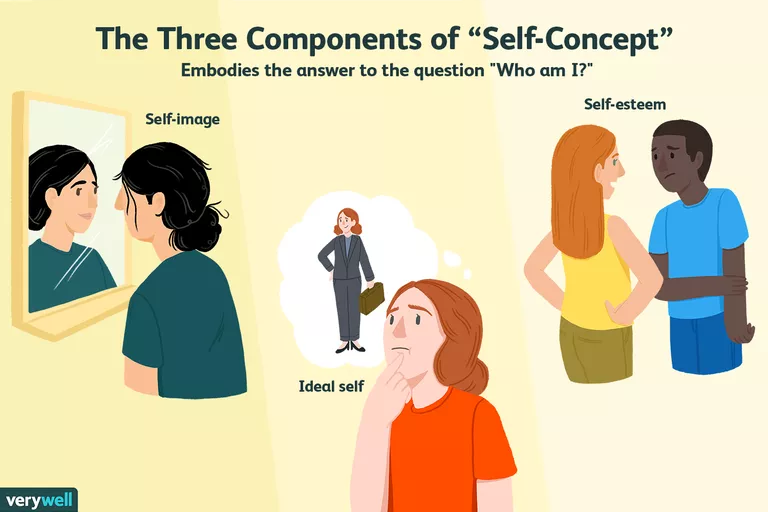We’re living in a time of extreme change, uncertainty, and ambiguity, impacting on our level of self-esteem and identity. This requires us to question, “Who am I?”
Your self-concept is “who are you?” What makes you, “you?”
It is the image you have of yourself. And this self-image will change and evolve over time, as you interact with people close to you and the relationships you have with others, built over time.
Your self-concept is how you perceive your behaviour, abilities, and your unique characteristics. For example, your belief that “I am a generous person” or “I am pretty”, or “I’m an easy-going person”, are all part of our self-concept. These responses come you’re your internal sense of who you are. You develop this sense early in your life, but it goes through constant evaluation and adjustment as you grow and progress through life.
When you’re younger, and as you go through the process of self-development, your self-concept is more pliable, and changes as you grow and learn who you are and what’s important to you, and your self-concept changes accordingly.
A more basic definition of self-concept refers to the way you think about yourself, evaluate your appearance, thoughts, behaviours, and how you perceive yourself in comparison to others. While there are other theories of self-concept, I prefer the one by Psychologist, Carl Rogers. According to Carl, your self-concept is made up of three different parts:
- Self-image – How you see yourself and includes attributes like your physical characteristics, your social roles, and your personality traits, such as, generosity, integrity, loyalty, devotion, sincerity, self-control, kindness and many more.
- Ideal self – The person you want to be
- Self-esteem – How much you like, accept, or value yourself, which can be impacted by how others see you, how you think you compare to others, and your role in the community at large.
Self-concept plays an important part in your overall make-up and wellbeing. It affects the way you look at your body, how you express yourself, and interact with your family, friends, and society. It even influences how you think about circumstances and how you make decisions. Effectively, your self-concept determines what you will do or choose not to do, at any given moment in time.
Your self-concept represents your knowledge structures, attributes, and the goals you set yourself to achieve.
Need to design an image similar to the one below

Self-image
As mentioned above, your self-image is your personal view, or a mental picture, you have of yourself. It is your ‘internal dictionary’ that describes your characteristics and attributes of self, including attributes such as intelligent, beautiful, talented, lonely, selfish, and more. There are thousands of personal attributes, both positive and negative. As an exercise, make a list of all the attributes you think apply to you, both positive and negative attributes.
Creating a positive self-image
Your self-image is dynamic and constantly changing over your lifetime, and you can learn to develop a healthier and more accurate view of yourself, challenging the distortions you see in the mirror. You can start creating a more positive and healthier self-image by accepting and loving yourself and being accepted and loved by those you closely associate with. Here are some suggestions for you to implement to develop a positive self-image:
- Learn to accept and love yourself
- Accept that you are ‘you’ – unique
- Acknowledge how far you’ve come
- List all your positive qualities
- List your strengths and acknowledge your gaps
- Ask those you are close to, to help you identify your strengths and gaps
- Continue to develop your strengths, including continuous learning and development
- Confront negative thinking
- Chant positive affirmations
- Refrain from comparing yourself to others
- Identify childhood labels and identify their authenticity
Ideal self
Your ‘actual self’ is how you see yourself now. Your ‘ideal self’ is how you would like to see yourself in the future. Your ideal self, therefore, is an idealised version of ‘you’, created out of what you have learned from your life experiences, your relationships with family and friends, the demands of society, how you think you compare with others, and the extent to which you identify with role models. If your ‘real self’ is far from your ‘ideal self’, this might make you feel inadequate, dissatisfied with your life, consider yourself a failure, and affect how much you value yourself.
Your ‘real self’ can be likened to your self-image, whereas your ‘ideal self’ is how you want to be.
For example, “My goal is to earn more money and live an enjoyable life. I have the opinion that each day is outstanding and that with every challenge comes an opportunity. I do not worry about things beyond my control, or which I cannot change. I accept who I am and love myself and those I care about.” It’s a dream of everything you want to be.
There’s value in having an ideal self.
- It helps you to establish goals and build a roadmap to reach them
- It serves as a motivator – something to work toward
- Helps you to create a set of standards for yourself, to ensure your actions are in line with your personal values.
It is important to note that your ideal self must be realistic. Your ideal self is a true ideal and something that may not be attainable, if unrealistic. It may not truly reflect who you really are or may it be outdated. Your ideal self could also be inflexible, distracting you from reality.
Self – esteem
Your self esteem is your overall sense of personal value and self-worth. By having healthy self-esteem, it can influence your motivation, your mental health and the quality of your life. Therefore, self-esteem can be defined as how much you value and like yourself, irrespective of the circumstances you’re in.
Many factors define self-esteem. These include:
- Your identity
- Whether you feel secured,
- Your level of self-confidence
- Your sense of belonging
- Feelings of competence
Your level of self-esteem is important because it impacts on your decision -making abilities, the type and quality of your relationships, your emotional health and overall wellbeing. It also influences your motivation.
If you have healthy (balanced) self-esteem
- You will most likely have a good understanding of your skills
- You are realistic in your abilities and expectations
- You can maintain good, healthy, and trusting relationships with others who have similar attributes
- You can understand their needs and express your response appropriately to them
It is important to have balanced self-esteem that you are comfortable with. Low self-esteem tends to make you feel uncertain of yourself, your abilities, and your decision-making process. This impacts on your level of motivation and self-worth.
Overly high self-esteem may result in you overestimating your skills and abilities and a sense of false security. It may lead to you feeling a sense of entitlement, without backing up that belief in yourself. This will impact on your relationships and interaction with those you love and care about. Overly high self-esteem can prevent you from self-improvement and instead of having a growth mindset, you are fixated on seeing yourself as perfect.

